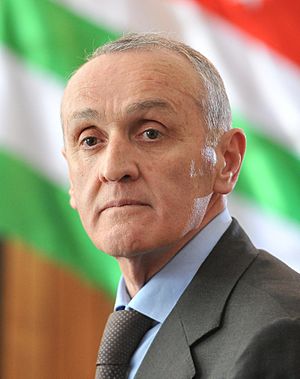Alexander Ankvab facts for kids
Alexander Zolotinskovich Ankvab (born 26 December 1952) is a well-known politician and businessman from Abkhazia. He served as the president of Abkhazia from 2011 to 2014. Before becoming president, he was the prime minister from 2005 to 2010 and then the vice-president from 2010 to 2011. He later returned to the role of prime minister in 2020 and served until 2024.
Quick facts for kids
Alexander Ankvab
|
|
|---|---|
| Алеқсандр Анқәаб ალექსანდრე ანქვაბი Александр Анкваб |
|

Ankvab in 2011
|
|
| Prime Minister of Abkhazia | |
| In office 23 April 2020 – 18 November 2024 |
|
| President | Aslan Bzhania |
| Preceded by | Valeri Bganba |
| Succeeded by | Valeri Bganba (acting) |
| In office 14 February 2005 – 13 February 2010 |
|
| President | Sergei Bagapsh |
| Preceded by | Nodar Khashba |
| Succeeded by | Sergei Shamba |
| 3rd President of Abkhazia | |
| In office 29 May 2011 – 1 June 2014 Acting: until 26 September 2011 |
|
| Vice President | Mikhail Logua |
| Preceded by | Sergei Bagapsh |
| Succeeded by | Valeri Bganba (Acting) |
| Vice President of Abkhazia | |
| In office 12 February 2010 – 29 May 2011 |
|
| President | Sergei Bagapsh |
| Preceded by | Raul Khajimba |
| Succeeded by | Mikhail Logua |
| Minister for Internal Affairs of Abkhazia | |
| In office 24 June 1992 – 1993 |
|
| Preceded by | Givi Lominadze |
| Succeeded by | Givi Agrba |
| Personal details | |
| Born | 26 December 1952 Sukhumi, Abkhazian ASSR, Georgian SSR, Soviet Union |
| Political party | Aitaira |
| Alma mater | Rostov State University |
| Signature |  |
Contents
Early Life and Career
Alexander Ankvab was born in Sukhumi, the capital of Abkhazia. He studied law at Rostov State University in Russia. After finishing his studies, he worked in different government roles. These included positions in the Justice Ministry and the Interior Ministry.
In 1991, he was elected to the Abkhazian Supreme Soviet. During the conflict between Abkhazia and the Georgian central government in 1992–1993, he became the interior minister for Abkhazia's government. After the conflict, he moved to Moscow in 1994 and became a successful businessman.
Political Journey
Presidential Elections
Ankvab returned to Abkhazian politics in 2000. He started a group called Aitaira, which means "Revival." This group was against the government at the time.
In 2004, he wanted to run for president. However, he was not allowed to because he did not meet all the requirements. One rule was that candidates must speak the Abkhaz language. After this, Ankvab decided to support Sergei Bagapsh for president. His support was very important for Bagapsh's success.
In the 2009 presidential election, Ankvab ran as Sergei Bagapsh's vice-presidential candidate. They won the election together. Ankvab then became the Vice President.
Becoming President
After President Bagapsh sadly passed away in May 2011, Ankvab became the acting president. He then ran for president in a special election held in August 2011. During the election, some claims were made about his past activities. Ankvab won the election with about 55% of the votes. He officially became the president of Abkhazia on 29 May 2011.
Challenges as President
During his time as a politician, Alexander Ankvab faced several dangerous situations. He survived six attempts on his life between 2005 and 2012. In the last attempt in February 2012, two of his guards were killed. He himself was hurt in two earlier attacks. After the 2012 attack, some people were arrested in connection with the incidents.
End of Presidency
On 27 May 2014, many people protested against President Ankvab in Sukhumi. They accused him of ruling unfairly and not handling money well. They also said he did not do enough to stop corruption and fix economic problems. Another issue was his policy that allowed some ethnic Georgians to become voters in Abkhazia.
The protesters entered the presidential building, and Ankvab had to leave Sukhumi. He went to a Russian military base. Ankvab said these events were an attempt to take power by force. On 31 May, the Abkhaz Parliament said Ankvab could not perform his duties as president. They appointed Valery Bganba as a temporary president. The next day, on 1 June 2014, Ankvab stepped down from his role as president.
Return as Prime Minister
On 24 April 2020, Alexander Ankvab was appointed prime minister of Abkhazia again. This happened after the previous prime minister, Valery Bganba, resigned. Ankvab served in this role until 19 November 2024. He resigned along with President Aslan Bzhania following protests against a new agreement with Russia.
See also
 In Spanish: Alexander Ankvab para niños
In Spanish: Alexander Ankvab para niños
 | Toni Morrison |
 | Barack Obama |
 | Martin Luther King Jr. |
 | Ralph Bunche |

